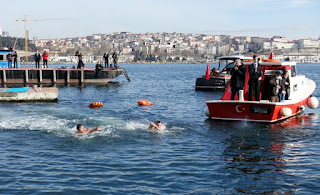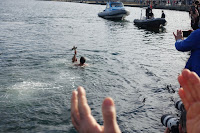"The ones for marriage are four lira; the rest are two lira," the older woman explained patiently as I surveyed the plastic takeout containers arrayed across the tables she and a few others were setting up on the sidewalk before the sun had even fully risen. Each small tub was filled with tiny colorful trinkets loosely connected in some way to the label on its lid: "araba için" (for car), "okul için" (for school), "bebek için" (for baby), and more than a dozen others.
Despite the early hour, a small trickle of people, mostly women, were already finding their way to this drab street corner around the back side of the sprawling İMÇ complex in Unkapanı, where high walls hid all but the cross atop the Ayın Biri Kilisesi.
I can say without a doubt that I've never run to church before, but not knowing whether this tradition that I'd heard about over the years would be continuing during pandemic times, I figured this way I would have gotten my morning exercise in regardless. So I pulled on long tights instead of my usual shorts, tossed a long-sleeved shirt, a T-shirt dress, and a scarf (just in case – having grown up Protestant and being nonreligious for decades, I'm never quite sure what the etiquette in an Orthodox church should be) in my running backpack, and headed out the door, catching glimpses of a rich violet and magenta sunrise between buildings in Beyoğlu and crossing the Atatürk Bridge over the Golden Horn with morning traffic on one side and fishermen lined up on the other.

The Ayın Biri Kilisesi, a Rum (Greek) Orthodox church, is best known – as its extremely literal nickname, "First of the Month Church," suggests – as a place to go on the first day of each month, to seek good fortune in some aspect(s) of your life. (Its "real" name is variously listed as Vefa Kilisesi, after the neighborhood, or Meryem Ana Kilisesi, based on
one story of its origin, in which the Virgin Mary appeared in a dream to an Albanian Orthodox girl and told her that there was a holy spring underneath her family's garden and that a church should be built there.) As with many such folk traditions, actual religiosity seems to be no barrier to participation, with members of the majority Muslim population joining the city's few remaining Christians. After the year we've all had, I too figured any potential source of luck was worth giving a try.
After slipping my more-modest change of clothes on over my running kit, I selected five gold-hued trinkets from the tables outside the church, each attached to a short, brightly colored ribbon with a small safety pin: a hamsa/Hand of Fatima, başarı için (for success); a dragonfly, kariyer için (for career); a lock and key, huzur mutluluk için (for serenity and happiness); a heart, sağlık için (for health); and a slightly different heart, aşk için (for love).

Though I'm told the first-of-the-month ritual can draw hours-long lines when it fall on a (non-lockdown!) Sunday, on this Monday morning, the courtyard enclosed by the church's walls was serene. A handful of visitors sat on benches, chatting and drinking tea alongside some scattered gravestones and column capitals, while others lit candles inside a cabin-like building, or waited to get into the main church. One man walked around handing out candy, which I later learned is a show of gratitude displayed by someone whose wish made previously at Ayın Biri had been granted.

Icons adorned the walls inside the small but prettily decorated and lovingly tended church, where a slightly bewildering array of rituals awaited. (Fortunately, I ran into a friend who'd visited previously and could provide some guidance.) From one booth, a man offered small keys for four lira each. Next were candles lined up on a stand with a slot for donations. In the corner, a priest asked me my name, then placed a heavy embroidered cloth over my head and intoned some almost inaudible words. Here and in a small chamber downstairs that also houses a holy spring said to date to the early 1700s, people paused before icons hanging on the walls. Holding up their little keys, they mimed the motion of unlocking each side of the cabinets around the images, or tracing their outlines. My nominally Catholic friend suggested I cross myself with each trinket as I moved along the line, which I did, crossing the one representing the wish I
most want fulfilled in front of a few different icons for good measure.
If any of my wishes come true, I'll do as tradition holds I should and return the "blessed" key to the church, along with sweets to share with those who haven't been so lucky yet.






















